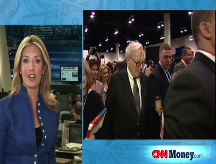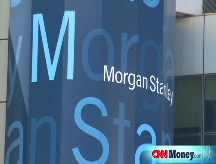Buffett's bet: $5B down, $695B to go
Berkshire Hathaway's investment in Goldman Sachs is good news... for Goldman Sachs. But not necessarily for all banks.
NEW YORK (CNNMoney.com) -- Berkshire Hathaway is investing $5 billion in Goldman Sachs. Too bad Warren Buffett doesn't have another $695 billion lying around so that taxpayers wouldn't have to foot the bill for the bank bailout.
Seriously though, the Oracle of Omaha's decision to take a stake in Goldman is good news...for Goldman (GS, Fortune 500).
That's because it's getting $5 billion in capital. The company also is raising another $5 billion through a sale of common stock.
But make no mistake. Even though many bank stocks enjoyed a bit of a pop on Wednesday morning along with shares of Goldman, investors should not interpret Buffett's Goldman investment as a sign that the worst is over for the financial services industry.
Buffett is not calling a bottom for the sector. He may just be calling a bottom for Goldman.
It's also worth noting that Buffett didn't buy shares of Goldman's common stock. Berkshire is investing in preferred shares that will pay a whopping 10% dividend and that can be called at any time for a 10% premium. Buffett isn't being an altruist. He's being an opportunist.
What Buffett is signaling is that he's identified a solid company he thinks is undervalued and he is seizing the chance to invest in that firm. That's what he always does. He is a stock picker, not an index fund manager.
Along those lines, it's worth noting that the six financial stocks that Berkshire (BRKA, Fortune 500) owned as of June 30 have fared much better than the overall market and banking sector this year.
The Berkshire six are down an average of just 6.7% this year compared to a 19% drop in the S&P 500 and 28% plunge in the S&P Banking Index.
What's more, three of the bank stocks Berkshire owns -- Wells Fargo (WFC, Fortune 500), U.S. Bancorp (USB, Fortune 500) and M&T Bank (MTB) -- are actually up this year.
That's an astonishing feat given the negativity surrounding the financial sector and is a testament to the fact that Buffett only invests in quality companies.
These three banks have not been hit nearly as hard as others during the credit crisis because they were more conservative than many of their rivals.
And all three have continued to report profits even as many competitors bleed red ink because of exposure to soured subprime mortgages.
Now of course, not every Berkshire investment turns to gold. The firm's other three financial services investments, SunTrust (STI, Fortune 500), American Express (AXP, Fortune 500) and Bank of America (BAC, Fortune 500), have all suffered double-digit percentage losses this year. Yet, these three companies also have remained profitable during the credit crunch.
So if investors should take anything from Berkshire's investment in Goldman, it should be this. Not all banks are toxic.
As I pointed out last week, there is a negativity bubble surrounding financial companies. Many reasonably healthy banks have been unfairly punished simply because they are banks.
This is a time for patient investors to do their homework and find, like Buffett did, companies that will be the survivors in this brave new financial world.
Don Wordell, manager of the Orlando, Fla.-based RidgeWorth MidCap Value fund, said he likes two smaller investment banks, regional firm Raymond James (RJF) and New York boutique Lazard (LAZ).
Wordell believes they will benefit from the rapidly changing landscape on Wall Street now that Goldman and Morgan Stanley (MS, Fortune 500) have become bank holding companies.
Matt Kaufler, co-portfolio manager of the Touchstone Value Opportunities fund, said he's also seeing some values in beaten down financials. His fund owns regional banks Fifth Third Bancorp (FITB, Fortune 500) andKeyCorp (KEY, Fortune 500), for example.
Even though both Midwestern-based banks have been hit hard in the credit crunch, he likes the fact that both firms have solid assets they could sell to raise more capital. Fifth Third has a lucrative credit-card processing division while Key owns money manager Victory Capital.
Kaufler added that he also likes specialty insurer Assurant (AIZ, Fortune 500) and asset management firm Invesco (IVZ).
But Wordell said it's not time to aggressively buy traditional bank stocks since there is still so much uncertainty regarding the bailout.
"The problem is that there's not enough information. I need to know what the exact terms of the bailout will be," he said.
Kaufler agreed. If Buffett is not making big bets on the entire industry, neither should you.
"We are nibbling in financials but we still think it's best to be very cautious. You can't go out and indiscriminately buy bank stocks," Kaufler said. ![]()




